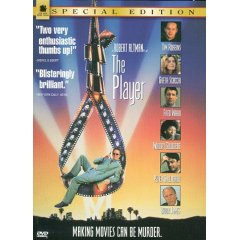 Mikaela writes:
Mikaela writes:
Fascinating article today in the NY Times about a new sequel from the author of The Player, which was turned into a movie with Tim Robbins, directed by Robert Altman, which is one of my top ever films.
This guy is a real insider outsider, and a crank, and an incredibly interesting man. He's a Hollywood screenwriter who talks about the dark side of Hollywood.
In this article, though, he goes further to talk about the role of American cinema in today's geopolitcal world. His a fascinating perspective that I need to think about more, and I'd love to hear what some of you think, too.
"I do think the movies help bring people together. If there was an Arabic cinema that was as good as the Asian cinema, there’d be less tension in the world. I believe that. When the movies were good, America was more popular in the world. The movies showed the world something really powerful, and that vision was so powerful that the movies were restricted, totalitarian regimes tried to keep the movies out because they were so powerful.
"The American myth is the little tailor that could, the yeoman who can grow up to be president, the humble log cabin leads to the emancipation of the slaves. That’s the most threatening idea in the world."
At least it was. Now, as Griffin Mill explains, the world has turned off the fantasies that America once fed it: “When the moral lessons of the movies can’t blunt the pain or give you energy because you’re too poor or hungry or scared or trapped — so trapped that the Journey of the Hero is the story of how your oppressors won King of the Hill — you can’t be helped by anything except violence in the real world, but it’s the kind of violence the movies lay off on the villain, mass violence.”





|